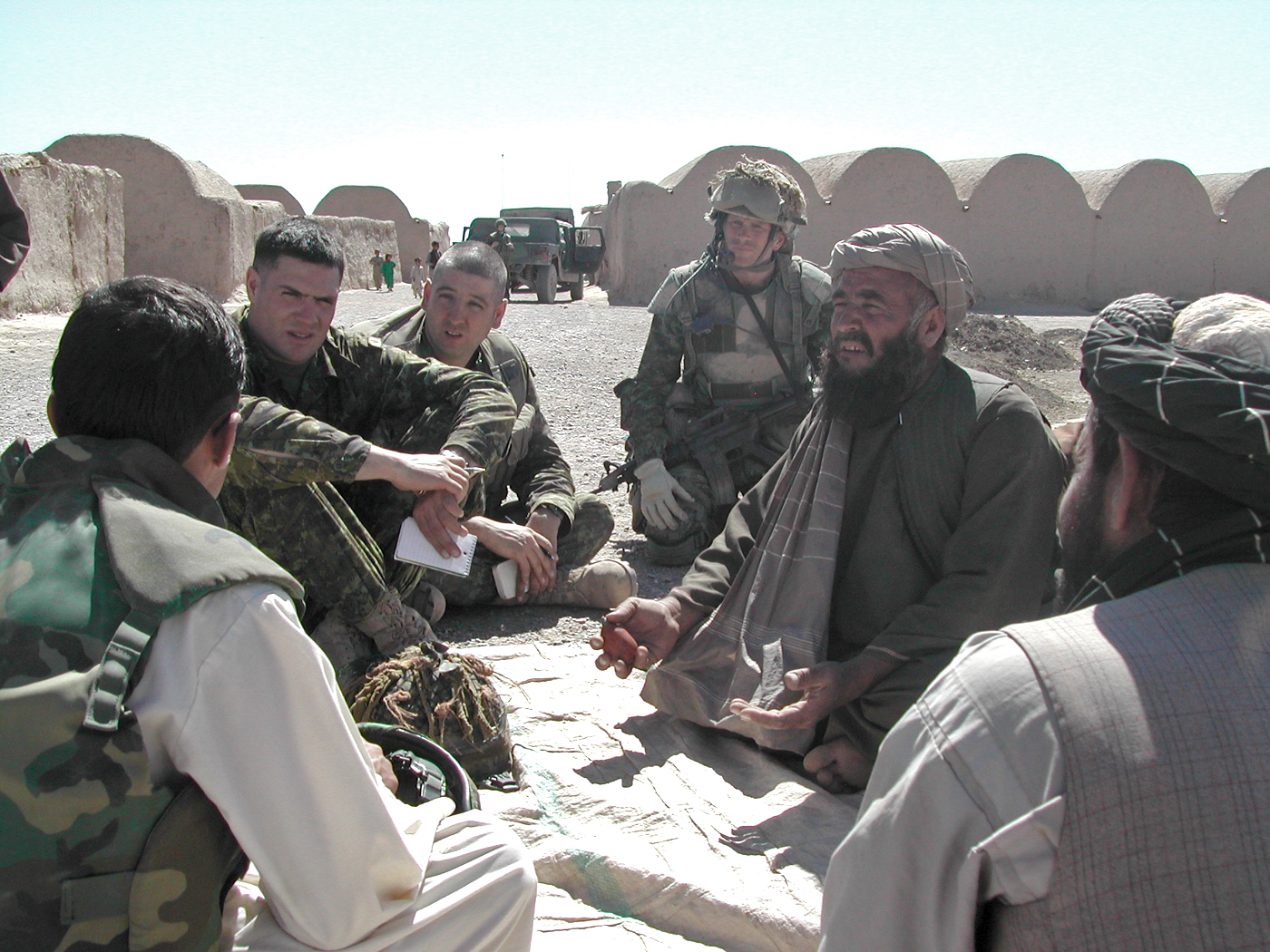
Major John Vass of the 3RCR Battle Group speaks with a village elder through an interpreter near Kabul on Sept. 20, 2003. The translator’s identity is protected to prevent Taliban retribution.
[Stephen J. Thorne]
In a Sept. 29, 2023, letter to Defence Minister Bill Blair, Gregory Lick said 15 of the former “language and cultural advisers” now living in Canada had contacted his office since July complaining that claims they filed with the Workers Safety and Insurance Board of Ontario (WSIB) have not been adequately addressed.
“To date, their efforts to seek treatment and care for their mental and physical needs sustained while supporting our troops have been met with inaction,” said the letter, published on the ombudsman’s website. “Both medical treatment and injury financial compensation have been inadequate or non-existent.”
Many Afghans, and some Pakistanis, did multiple tours translating and advising Canadian troops between December 2001, when the country’s first special forces troops arrived in the war zone, and March 2014, when the mission ended and the last training cadre left. Canada withdrew its combat troops in 2011.
During their service, many of the so-called language and cultural advisers (LCAs) and their families were threatened. Several were killed, executed or wounded by the Taliban; others were left with multiple mental and physical health issues.
Ottawa initially provided refuge to those facing proven threats due to the work they did for Canada, bringing in about 800 former translators and family members before the program expired in 2011. About 7,500 more, including family members, have arrived in Canada since the war ended in a Taliban victory in August 2021.

Members of the 3RCR Battle Group meet with village elders south of Kabul on Oct. 9, 2003. The translator’s identity is protected to prevent retribution.
[Stephen J. Thorne]
Many served more than five years “without pause or relief.”
Some translators spent more time on combat operations than the troops they worked for. They did dangerous jobs, gathering intelligence, monitoring communications, warning of impending attacks, and helping commanders better understand local culture. But they were contract employees and ineligible for equivalent federal benefits, even though most who came here have become Canadian citizens.
“While an appeal process is underway for some,” wrote Lick, “the facts of this matter demonstrate a lack of government support for these Canadians. This is poised to become a shameful chapter in Canada’s military history.
“The care for these former Language and Cultural Advisors is a moral obligation, and their well-being is a Government of Canada responsibility.”
Lick said military intelligence recruited them and that troops who served with them described them as essential to operations. He said many served more five years “without pause or relief,” and received accolades and commendations from successions of task force leadership.
They were initially told that they would be working strictly inside the relatively safe confines of Kandahar Airfield, Lick said, but “within days” found themselves in forward operating bases, villages, convoys and battle zones.
“Knowing the inherent risks associated with their essential work in supporting deployed members of the CAF, appropriate efforts were not undertaken to ascertain the LCAs’ welfare post-deployment,” the ombudsman wrote.
“Despite efforts within Assistant Deputy Minister Human Resources (Civilian) Total Health Management to assist these former LCAs by validating the nature of their specialized and dangerous work, the WSIB adjudications have so far been unfavourable to the LCAs and could indicate that the WSIB is not adequately calibrated for these deliberations.”

Captain Alex Watson (left) and village elders converse through a translator during a meeting near Kandahar in 2002.
[Stephen J. Thorne]
“We understand that they worked for us, and we want to make sure that we help them.
Lick said media coverage and public response to their plight has shown “overwhelming” public as well as rank-and-file military support for the translators.
“Despite recent efforts by the Department to provide validation to WSIB in support of their claims, meaningful relief has not been forthcoming. Leaving this issue unresolved serves neither the Government of Canada, the former LCAs, nor Canadians’ interests.”
WSIB case workers overruled assessments by psychiatrists and social workers in dismissing benefits claims by more than a dozen former interpreters last spring.
The board subsequently agreed to review the cases. A WSIB spokesperson told CBC the agency has been working with 17 claims involving former military language and cultural advisers. The ombudsman had been in contact with 15 of them.
“We are working as quickly and thoroughly as possible,” Christine Arnott, WSIB public affairs manager, told CBC News. “Sometimes, reaching a determination can take longer than we’d like as we need to obtain medical, employment and other relevant information from many years ago.”
Arnott said decisions would be made before Christmas and would contain detailed explanations for the advisers to consider.
Blair said he’d met with the ombudsman and is looking for a solution.
“We understand that they worked for us, and we want to make sure that we help them in every way possible.”
The federal government was aiming to have brought in a total of 40,000 Afghans between August 2021 and the end of 2023. The most recent figures had the number at 37,000.
Advertisement


















